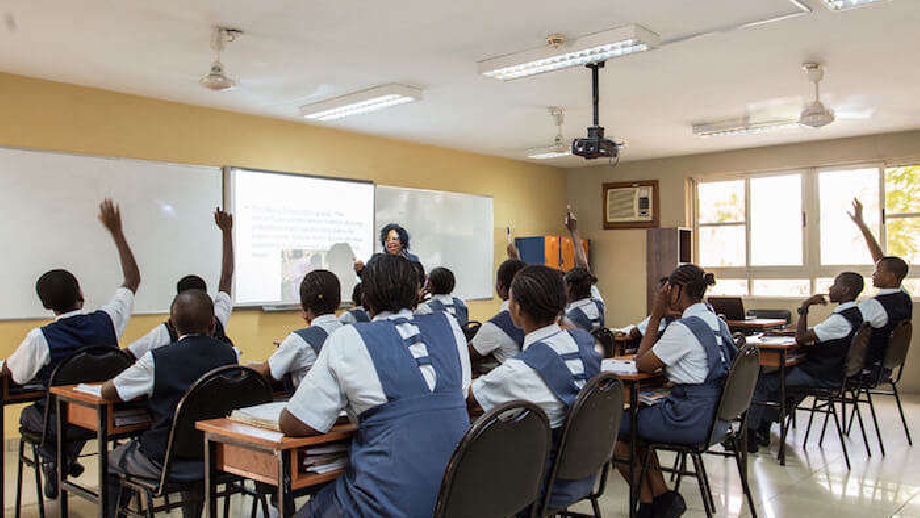
The quality and availability of English language teachers in public schools across Rivers State have been a growing concern for many people.
A 2022 article by Dr. Ganiu Bamgbose posits the decline in the standards of teaching and learning English in Nigeria started in the mid-1980s. In essence, Nigerians who attended schools during the colonial era and 25 years after the colonial era, fared better in both spoken and written English. Recently on social media, videos of Nigerians from the 50s,60, and 70s trended, calling attention to the crystal-clear English they spoke with little to no grammatical errors. This has made Nigerians question why and how many of us have evolved poorly to speak English so differently from our grandparents. With Rivers State as my focal point, I decided to dig deeper to unravel why the standards of written and spoken English have declined.
Observation
I went to three public schools within Obio/Akpor Local Government Area and interacted with some students. I checked their notebooks to see what they were being taught. I saw clearly how the lessons were divided into comprehension, grammar, lexis and structure, oral English, and literature. When I asked them if they felt their English teachers were doing a great job, they unanimously agreed that they were doing a great job. I quickly discovered the dearth of teachers when I asked how many teachers teach them the English language. One of the students told me that there were over one hundred students crammed in one classroom. Also, they have one teacher teaching two classes and another teacher teaching the other two classes. It was at this point I realized that there could be a shortage of English teachers in these schools. A teacher teaches over two hundred students, grades their weekly and midterm assessments, and their end-of-term examinations. That same teacher is expected to teach the different language aspects–comprehension, lexis and structure, grammar, oral, and literature. This can be quite daunting.
I immediately channeled my focus to the teachers. At this point, I felt it was important we understood what some of the teachers are going through – the stress from the enormous amount of work they have to do daily. At first, it was difficult to get a teacher to speak on the subject because they feared that a report might speak negatively of the headteachers who could seek them out and relieve them of their jobs. However, two teachers granted me the audience.
Teachers' Testimonies & Observations
Christine, a teacher in one of the rural areas, tells me that though she has less number of students compared to her colleagues in the city, she still has over 100 students to teach and grade their papers. She teaches SS1 and SS2 classes although she says they do not have SS3 classes because the students often leave to sit WASSCE elsewhere. She also admits she teaches all aspects of English; however, she believes different language aspects should be taught by different teachers depending on their strengths. She lamented that teachers in the city bear the brunt of the situation as they can teach as many as 4 arms with each arm covering a class of 50 students. This explains the over one hundred students in a class as reported earlier by one of the students I interacted with in the city of Port Harcourt.
“There are people who teach the English language that are not qualified to teach,” Christine revealed. “ In some schools, especially in the rural areas, we don’t have any qualified English language teachers. So, those who teach the language are people who feel they can teach the language or people who volunteer, but the challenge we have is that when the kids get to senior level, the new teachers they meet will have to help them unlearn a lot of the wrong concepts they have learned”.
She recounted the experience she had during her teaching practice in the city.
“I remember when I was doing my teaching practice in one public school in the city, I had over 80 students in one arm and I was teaching two arms during that period. The students had to sit on their desks. Some had to stand, and you had to raise your voice to be able to get to the back. It is difficult to move around the classroom because there is no space between the rows for you to be able to freely move to the back to ensure that everybody is paying attention to the lesson.”
Christine said though the classes were not conducive and teachers seemed overworked, the students seemed eager to learn in those days as compared to now. She added that learners nowadays are no longer as enthusiastic as before, and–the worst is that–they only tend to appear mostly during the assessment week.
“The teacher is saddled with so much. It is common to have the English language four times a week in the timetable. And the teacher has to cover so much. Sometimes, the teacher is not confident in this aspect of the lesson but because it is there in the scheme, they have to try to teach it. So, sometimes, they just gloss over it, or sometimes they avoid that aspect of the language entirely because they know they are not good in that aspect of the language.
Christine also shared another profound piece of information about how the method of teaching English in Nigeria affects the student’s performance in the language. “When people go for international English language proficiency exams, their language is assessed based on their skills. They assess based on the skills: reading, listening, writing, and speaking. But this is not the way we do it here. We teach everything together and sometimes we don’t teach some aspects. These are some of the reasons why the learners don’t learn well.”
She added that she learned to cope with the stress of teaching large classes by creating new strategies for grading papers “I discovered that sometimes when you give classwork or assignments, some learners stop coming to school entirely because they have not done that assignment and you will punish them for that. So, as a result of that, the group assignment makes it easier. So each person contributes something to the answer, and one person takes it down and I collect just one script from the group. It makes it easier for me to mark and for more students to participate.”
Christine spoke on what causes the students to have poor pronunciation. “How are they going to speak well when their teachers don’t speak well? Studying the English language in Nigeria is a huge challenge because the pronunciation we should use is Received Pronunciation. Many of our lecturers don’t use the pronunciation correctly. For those who do, it must have been personal efforts, perhaps.”
Christine faulted the Rivers State Ministry of Education’s approach of not having a unified scheme of work. She said the big private schools often combine curricula from different countries such as American, British, and French curricula while the smaller private schools use WAEC, NECO, AND JAMB. However, teachers of public schools just teach what they are comfortable with. “If there is no uniformity, but the exams are uniform, how do you expect the students to all perform well?” she asked.
Another teacher, Lera, narrated her grievances. Lera tells me that the burden is too much to bear for her. In her case, she teaches 4 classes, with each class made up of three arms of 50 students each. A total of 600 students to teach and grade their papers. Lera lamented how the corp members assigned to her do not even stay to help her mark the script of nearly 600 students. She called on the National Youth Service Corp to do their routine inspection and fish out those corp members unserious about imparting knowledge to the young ones.
Implications of Factors
Having gathered this information, I decided to speak to a professor of English, Ibiere Ken-Maduakor to help us understand the implications of having a large class, a dearth of teachers, and a non-unified scheme of work.
Prof. Ken-Maduakor tells me how they have identified large classes as a huge problem for teachers, and due to the inevitability of the situation caused by a shortage of teachers and lack of infrastructure, they created workshops for teachers to address how they can manage large class sizes. “It's not possible for the teacher to assess all the learners, and attention may not be given to weaker learners. It will affect their output causing frustration for the teachers”. She says during teacher training workshops, teachers are advised to devise means of engaging the learners through group work, giving them projects, and following up to get feedback.
She also said that one of the reasons why some students perform poorly in some aspects of the English language is due to a lack of compartmentalization of the English language. “One person usually gets to teach every aspect of the English language. It's always best to have different teachers teach different aspects of their strengths. The result of this sort of training is that the teachers influence the pupils and sometimes they learn the wrong things which are harder to change”.
Prof Maduakor re-echoed the issue of a non-unified syllabus in Rivers State. She disclosed that upon her investigation, she discovered that Lagos has a well-developed, unified scheme of work for the state. “The English Language Teachers Association of Nigeria (ELTAN) has noticed this. Rivers state needs a unified scheme of work where different experts are brought together to sit down and devise a workable scheme of work that Rivers state can adopt”.
She also tells me how some teachers during several private interview sessions with her, opened up about being inadequate in some aspects of the English language, thereby potentially shortchanging the pupils in these aspects. Prof Ken-Maduakor also said that listening is one skill that is severely under-taught in Nigeria because teachers do not know how to teach it, thereby leading to the skill being underdeveloped among our learners.
Speaking to an educator, Dr Ikechi Worgu, he recounted how during his time in a unity school, he had 5 teachers teaching a language course such as English and Igbo. Each teacher focused on an aspect. However, over time, the standard declined. Dr Worgu emphasized that some teachers have different strengths in different aspects.
In addition to what the teachers have mentioned as factors that affect the standard of spoken English in Nigeria, Dr Worgu added that the quality of English being spoken at home and within the neighborhood, and the detail with which the English language is taught are also among the factors that hinder fluency. He said what the kids are exposed to also helps them. “During my time in secondary school, my oral English teacher advised us to listen to the NTA news. The kind and quality of books one reads can help them too. You can learn from movies and fluent pastors. The media plays a major role in influencing how we speak English”
He blames the government for not paying full attention to the teacher’s remuneration which has led to a teacher shortfall thereby negatively affecting the children.
Dr Worgu says since the government paid less attention to the teaching profession, many Nigerian teachers have migrated abroad. “Under the leadership of George Weah, there was a call for Nigerian teachers and a mass exodus of Nigerians to Liberia for greener pastures”.
“When the desirable is not available, the available becomes desirable,” he said, pointing at the quality compromise caused by the dearth of teachers in the state. “The government of the day has a lot of work to do in terms of providing incentive and appropriate up-to-date modern professional training courses to help retain and improve the quality of the teachers left in Nigeria.”
Dr Worgu also stresses that people do not want to undergo personal development these days. He talked about the professor of law who wrote a book that was considered an eyesore. He said the professor seemed interested in the business of publishing but not at all interested in improving himself. Dr Worgu also mentioned the mentality of people who say “English is not my language and I can speak it anyhow I want” suggesting that it is courteous to speak someone’s language with dignity. He also mentioned how such poor language construction has crept into the movie industry.
Reacting to how some teachers teach up to one hundred and fifty students in a class, Dr Worgu says the United Nations teacher-to-student ratio is twenty-five pupils to one teacher. He says this ratio makes for better interaction and easy management of the class and equally allows the teacher to be in the lives of their children. He mentioned that during his time, they had 50 pupils in one class which seemed huge then, let alone the enormous amount of stress the teachers have to pass through now teaching a class of over one hundred students.
Recommendations
Prof Ken-Maduakor stressed the importance of the Rivers state Government to employ more teachers and ensuring adequate training for these teachers in different aspects of the English language to ensure that the pupils have a wholesome experience of the language. She said English is no longer being given time like it used to before when she was still in the system due to the many vocational subjects that have been added to the curriculum, and there is an issue of continuity as the subjects are sometimes left for the corps members to teach.
Prof Ken-Maduakor advised the Rivers State Ministry of Education and stakeholders in the business of education to come together and strategize the way forward to uniformize the scheme. “For example, what are the aspects of oral English? Is it the same thing as phonics? Is there a way to merge them? Some people teach diction while some teach elocution. Are they related or different in any way? We need experts to give us something unified.” She stated how vital it is for the Government to provide textbooks for the pupils as it helps make the teachers' work easier and saves them the stress of having to improvise by always writing the passages on the board. She also advised that the selection process for teachers should be standardized to bar people from other disciplines from teaching the English language without the adequate knowledge needed to pass such knowledge. She also advised teachers to take responsibility for their own professional development by undergoing training online and even with the British Council. She also emphasized how vital it is that teachers are well-remunerated to ensure that they remain committed to their jobs. “Teachers spend more time trying to make ends meet. The salary is not enough for them. Instead of giving quality, the teachers are now more interested in trying to survive.”
She also advised the teachers to explore the use of AI to save them the stress of having to deal with complicated schemes, “I have my reservations with that AI because I think sometimes it makes people lazy but then if it will make it easier for them to get their schemes completed, then, maybe they should explore it.”
Prof Ken-Maduakor advised the Rivers State government to implement the extension of the retirement age of 65 years for teachers. This she said will help to ensure that able teachers can transmit their knowledge to younger teachers. However, she noted that the government should do its part by ensuring that teachers are constantly trained and retrained to understand the recent teaching methodologies and develop capacity in their usage.


